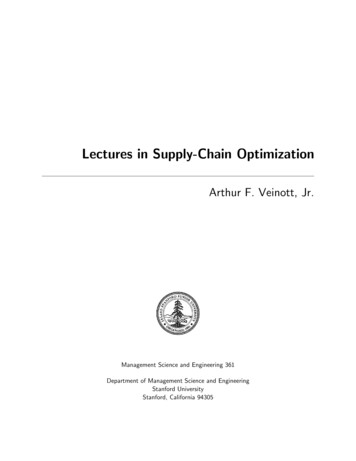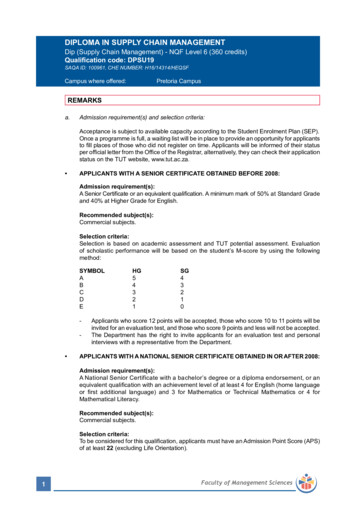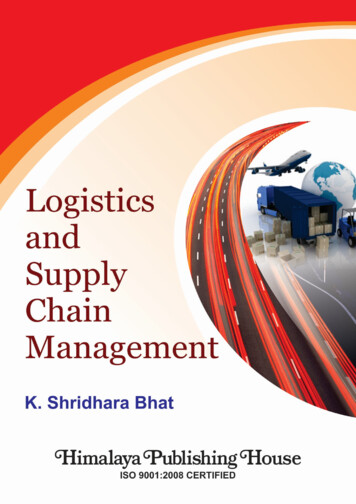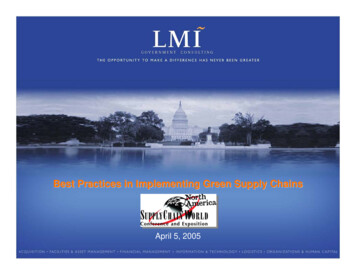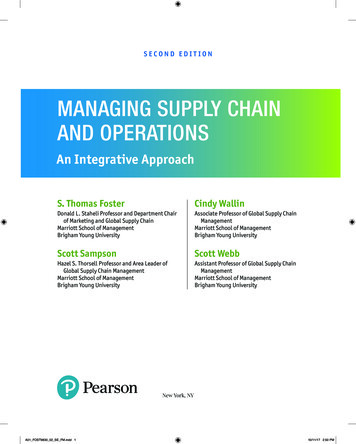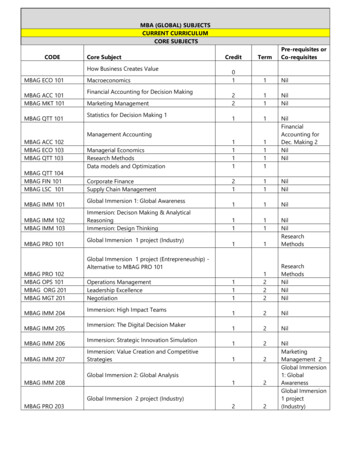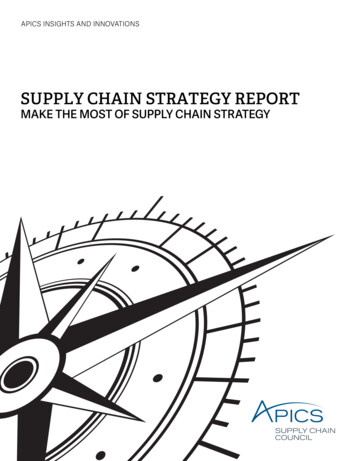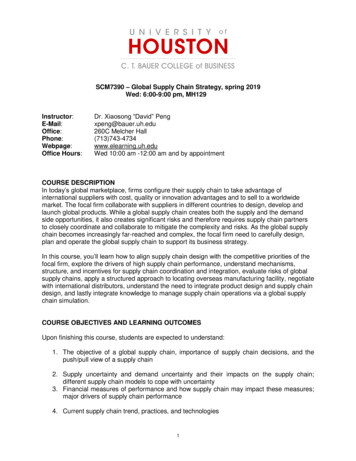
Transcription
SCM7390 – Global Supply Chain Strategy, spring 2019Wed: 6:00-9:00 pm, MH129Instructor:E-Mail:Office:Phone:Webpage:Office Hours:Dr. Xiaosong “David” Pengxpeng@bauer.uh.edu260C Melcher Hall(713)743-4734www.elearning.uh.eduWed 10:00 am -12:00 am and by appointmentCOURSE DESCRIPTIONIn today’s global marketplace, firms configure their supply chain to take advantage ofinternational suppliers with cost, quality or innovation advantages and to sell to a worldwidemarket. The focal firm collaborate with suppliers in different countries to design, develop andlaunch global products. While a global supply chain creates both the supply and the demandside opportunities, it also creates significant risks and therefore requires supply chain partnersto closely coordinate and collaborate to mitigate the complexity and risks. As the global supplychain becomes increasingly far-reached and complex, the focal firm need to carefully design,plan and operate the global supply chain to support its business strategy.In this course, you’ll learn how to align supply chain design with the competitive priorities of thefocal firm, explore the drivers of high supply chain performance, understand mechanisms,structure, and incentives for supply chain coordination and integration, evaluate risks of globalsupply chains, apply a structured approach to locating overseas manufacturing facility, negotiatewith international distributors, understand the need to integrate product design and supply chaindesign, and lastly integrate knowledge to manage supply chain operations via a global supplychain simulation.COURSE OBJECTIVES AND LEARNING OUTCOMESUpon finishing this course, students are expected to understand:1. The objective of a global supply chain, importance of supply chain decisions, and thepush/pull view of a supply chain2. Supply uncertainty and demand uncertainty and their impacts on the supply chain;different supply chain models to cope with uncertainty3. Financial measures of performance and how supply chain may impact these measures;major drivers of supply chain performance4. Current supply chain trend, practices, and technologies1
5. Causes of information distortion in supply chain, mechanisms for supply chaincoordination and integration6. Global supply chain landscape and evaluating regions and countries with respect to supplychain location decisions7. Sources and types of supply chain risks and supply chain risk mitigation mechanisms8. Developing sourcing strategies to support business objectives of a firms9. Aligning product design with supply chain design10. Selected emerging technologies that are expected to affect supply chain operations11. Supply chain decisions with respect to sourcing, demand forecasting, resource allocation,and production planning.COURSE MATERIALSLecture notes and handouts will be posted on Blackboard.Case: The course materials include eight case studies. There is a course page created onHarvard Business Online for you, where you can access the cases required for the course. Youwill have to register with Harvard Business Online to get access to the cases. This is the easiestand the least expensive way to have these cases.Weblink for downloading the case: The inexorable rise of Walmart? 1988-2016.SC Coordination and contracts in the sharing economy – A case study at CargoNike vs. New Balance: Trade policy in a world of global value chainRenesas Electronics and the Automotive Microcontroller Supply Chain (A)Predicting consumer taste with big data at GapCaseCradle-to-Cradle Design at Herman Miller: Moving Toward EnvironmentalSustainability7. Case: Maersk: Betting on BlockchainSimulation8. Global supply chain management simulation v2, Harvard Business SchoolPERFORMANCE EVALUATIONComponentsClass participationCase Analysis and presentation (25x3)Research PaperGlobal Supply Chain simulationExams (1)Points50 points75points50 points25 points150 points2
The letter grade for each student will be determined according to the following points scale:Percentage rangeLetter grade 93%A(90%-93%)A(87%-90%)B (83%-87%)B(80%-83%)BC CCD 0%-63%) 60%Case analysis: Seven cases are assigned to the class. Throughout the semester, the class willwork in teams to analyze and present the cases. Each team will take the lead to analyze (submita written analysis) and present one case. Each team will also analyze two other cases andsubmit written analyses only (no presentation). The cases will be randomly assigned to theteams by the instructor. The case presentation should focus on your team’s solution to theproblems to be solved and be brief on the industry and company background.Global Supply Chain Management Simulation“The simulation gives you an opportunity to design and manage the supply chain of a globalmobile phone manufacturer. During the simulation experience, your team design the mobilephone product line, forecast demand, choose a set of suppliers with different costs, lead-timesand capacities, and allocation production among your chosen suppliers.” The simulation isavailable from Harvard Business Publication website.Exam: One in-class exam will be given during the semester. The exam is closed book andclosed notes and is worth 150 points. The exam will include multiple-choice questions and shortanswer questions. You must bring a pencil and a large red Scantron sheet to the exam.White Paper AssignmentEach team will need to complete a white paper on a supply chain topic. The preparation of awhite paper summarizing state-of-the-art knowledge on a particular topic is a common industrypractice often assigned to up and coming managers.The following is a list of topics previously researched and reported: How to Build a Superior Supply Chain The Future of Supply Chain Management and E-Commerce Reverse Logistics in B-to-C e-Commerce How to Become the Central Link in a Supply Chain Speeding up the Supply Chain The Importance of Order Fulfillment and Transportation in e-Commerce Enabling a Global Supply Chain The Financial Implications of Effective Supply Chain Management How to Measure Supply Chain Management Success Issues Regarding Supply Chain Disruption3
The paper should have as a minimum five (5) cited sources. These references must beaccepted publications. Additional references, such as Wikipedia, should be kept as a minimum.Class Participation:Class engagement is an important part of this class, as it is in every Bauer course. Consistentwith this expectation, class participation will account for 50 points. Please e-mail me prior toclass if you are unable to attend class due to business or personal reasons. More than onemissed class will result in a lower participation score. Students who justifiably miss a secondclass can make up for the missed class, in terms of engagement score by doing extra-classwork (specified on a case-by-case basis by the professor). A third missed class cannot be madeup - your participation score will be considerably diminished. More than 3 classes missed willautomatically mean that the student does not qualify for a “pass” grade in the class. The honorcode applies in this class, as in all courses.COURSE POLICY AND PROCEDURESStudents are required to comply with all University of Houston academic regulations, policiesand rules. See website for details: OFESSIONALISM /PARTICIPATION/ADVANCING THE LEARNING OF OTHERSI view each class as a business meeting during which time we will discuss the assigned materialand related topics. During these meetings, I look for evidence of your preparation andunderstanding of the class material. This can only be exhibited by your in class contributions.Of particular importance are those contributions that help advance the understanding of others.Class attendance alone does not represent participation. Each student is also expected toconduct himself/herself in a professional manner as expected of future business leaders. Thisincludes respect for others, proper cell phone and computer etiquette, and timeliness amongother factors.If you have to miss a class, you must communicate to the instructor before the class.ACCOMMODATIONS FOR STUDENTS WITH DISABILITIESThe C.T. Bauer College of Business would like to help students who have disabilities achievetheir highest potential. To this end, in order to receive academic accommodations, studentsmust register with the Center for Students with Disabilities (CSD – telephone 713-743-5400),and present approved accommodation documentation to their instructors in a timely manner.ACADEMIC HONEST POLICYThe University of Houston Academic Honesty Policy is strictly enforced by the C.T. BauerCollege of Business. No violations of this policy will be tolerated in this course. A discussion ofthe policy is included in the University of Houston Student Handbook which can be found athttp://www.uh.edu/provost/policies/uhhonesty policy.html. Students are expected to be familiarwith this policy.LAPTOP AND CELL PHONE USE IN CLASSROOMYou are asked to turn off your cell phones (including smartphones) in class. The use of laptopcomputers is only allowed for taking class notes or doing class related research.COUNSELING AND PSYCHOLOGICAL SERVICES (CAPS) can help students who are havingdifficulties managing stress, adjusting to college, or feeling sad and hopeless. You can reachCAPS (www.uh.edu/caps) by calling 713-743-5454 during and after business hours for routineappointments or if you or someone you know is in crisis. Also, there is no appointmentnecessary for the “Let's Talk” program, which is a drop-in consultation service at convenientlocations and hours around campus. http://www.uh.edu/caps/outreach/lets talk.html.4
Course Schedule (tentative, subject to revision, depending on class progress) Introduction to supply chain strategy concepts andframework23-Jan Team formation30-Jan Mega trend of SCM White paper research presentation (Initial ideas) Supply chain design Case: The inexorable rise of Walmart?13-Feb Supply Chain Coordination and IntegrationCase: SC Coordination and contracts in the sharingeconomy – A case study at Cargo (for all teams)20-Feb Global supply chain managementCase: Nike vs. New Balance: Trade policy in a world ofglobal value chain27-Feb Managing risks in a global supply chainCase: Renesas Electronics and the AutomotiveMicrocontroller Supply Chain (A)6-Mar Midterm Exam13-Mar Spring break20-Mar Supply chain analytics Case: Predicting consumer taste with big data at Gap 10-Apr Product design, process design and supply chainmanagementCase: Cradle-to-Cradle Design at Herman Miller: MovingToward Environmental SustainabilityProduct design, process design and supply chainmanagementCase: Cradle-to-Cradle Design at Herman Miller: Moving TowardEnvironmental SustainabilityTechnology in the supply chainCase: Maersk: Betting on BlockchainGuest speaker (TBD)17-Apr White paper final presentation24-Apr Global supply chain management simulation6-Feb27-Mar 3-Apr 5
1 SCM7390 - Global Supply Chain Strategy, spring 2019 Wed: 6:00-9:00 pm, MH129 Instructor: Dr. Xiaosong "David" Peng E-Mail: xpeng@bauer.uh.edu Office: 260C Melcher Hall Phone: (713)743-4734 Webpage: www.elearning.uh.edu Office Hours: Wed 10:00 am -12:00 am and by appointment COURSE DESCRIPTION In today's global marketplace, firms configure their supply chain to take advantage of
